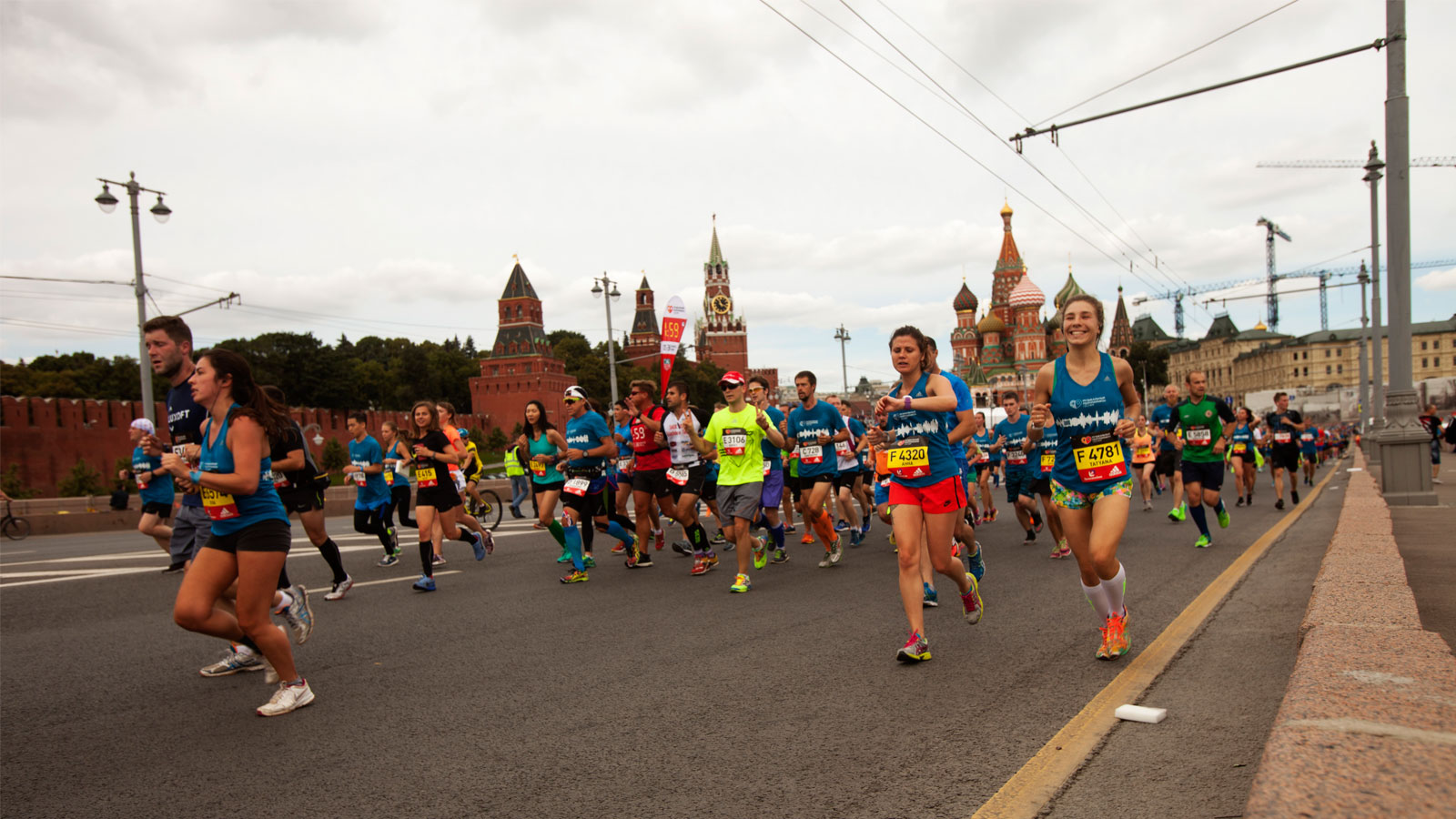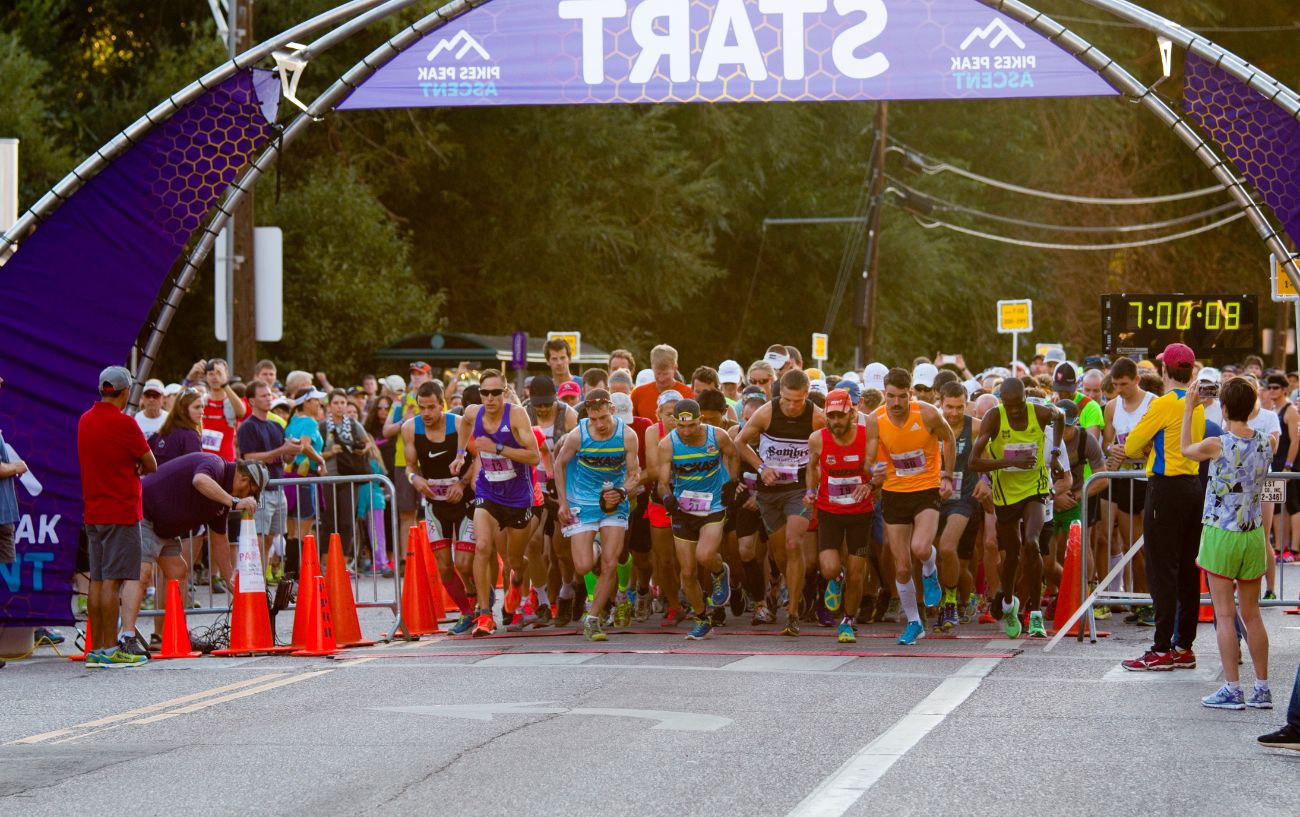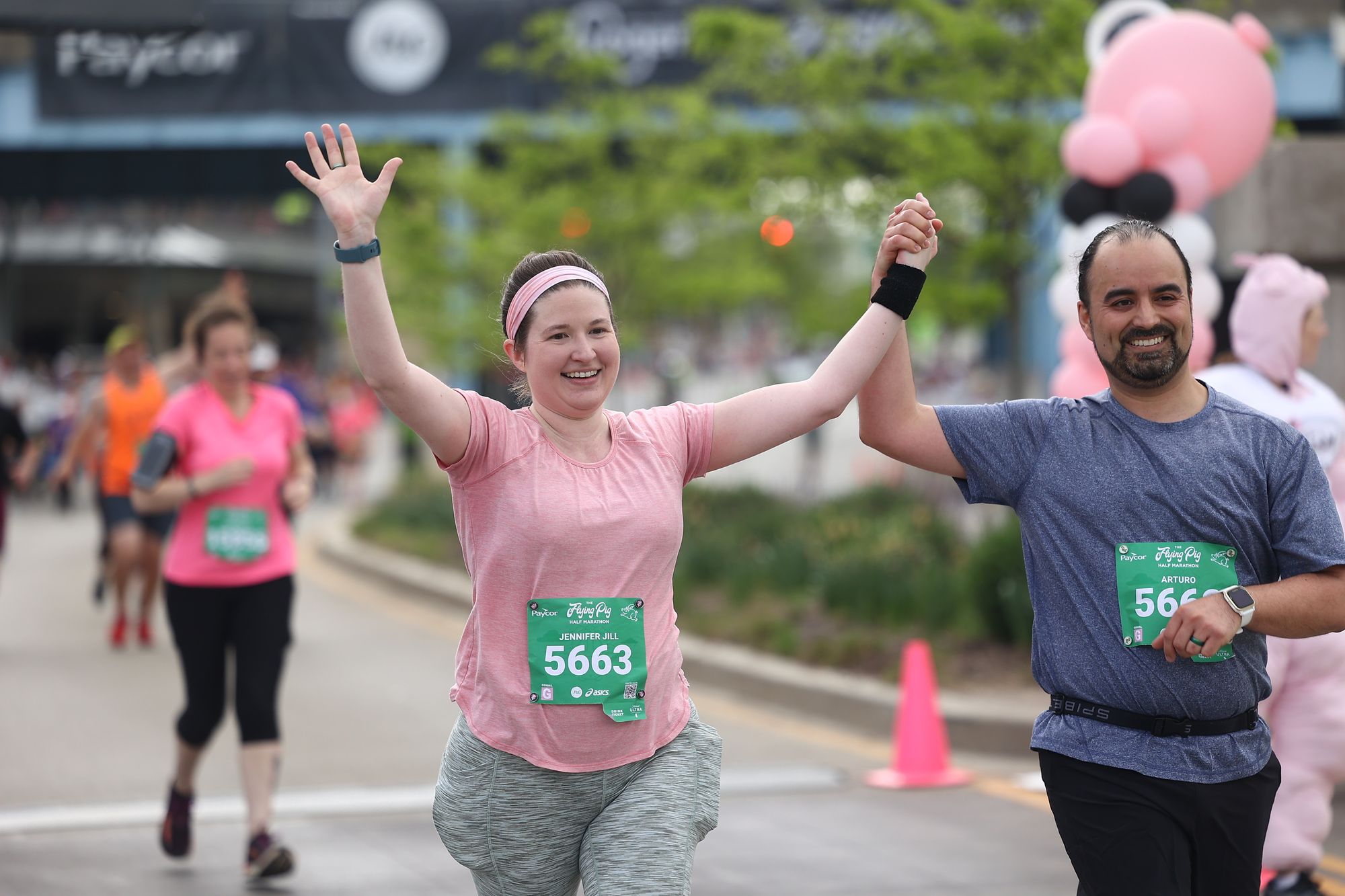

Featured
What Is A Beginner Half Marathon Time
Modified: January 22, 2024
Find out what is considered a good beginner half marathon time and get featured training tips and advice from experienced runners to help you reach your goal.
Introduction
Welcome to the exciting world of half marathons! Whether you’re a seasoned runner looking for a new challenge or a beginner eager to conquer your first race, completing a half marathon is an accomplishment worth celebrating. But before you lace up your running shoes and hit the pavement, it’s important to understand what a half marathon is and what factors can influence your performance.
A half marathon is a road race that covers a distance of 13.1 miles, or approximately 21 kilometers. It’s a popular distance among both recreational and competitive runners due to its challenging yet achievable nature. Running a half marathon requires a combination of physical endurance, mental stamina, and strategic training.
When it comes to determining a beginner half marathon time, it’s important to note that there is no “one-size-fits-all” answer. The time it takes to complete a half marathon can vary greatly depending on various factors, such as your fitness level, running experience, age, and genetics. However, having a general understanding of what constitutes a beginner half marathon time can provide a helpful benchmark.
For beginners, a typical half marathon time can range anywhere from 2 hours and 30 minutes to 3 hours and 30 minutes. This translates to an average pace of about 11 to 16 minutes per mile. However, it’s important to remember that these are just rough estimates and individual results can vary.
It’s also worth noting that half marathon times can differ based on gender. On average, male runners tend to finish a half marathon faster than female runners. This is largely due to physiological differences, such as higher muscle mass and greater aerobic capacity, which can give male runners a slight advantage.
Now that you have a basic understanding of what a half marathon is and what to expect in terms of beginner half marathon times, it’s time to dive deeper into the various factors that can influence your performance. By understanding these factors, you can better tailor your training and set realistic goals that will help you achieve success on race day.
Understanding Half Marathon
Before embarking on your journey to conquer a half marathon, it’s essential to have a thorough understanding of this popular race distance. A half marathon is a road race that covers a distance of 13.1 miles or approximately 21 kilometers. It sits halfway between a 10K race (6.2 miles) and a full marathon (26.2 miles), making it a challenging but attainable goal for many runners.
Half marathons attract a diverse range of participants, from seasoned runners aiming for personal bests to beginners seeking to complete their first long-distance race. The race provides an opportunity to push your physical and mental limits, while also experiencing the exhilaration and sense of accomplishment that comes with crossing the finish line.
One of the key advantages of the half marathon distance is that it offers a good balance between endurance and speed. It requires both physical stamina and efficient pacing to sustain your effort throughout the race. Unlike shorter distances, such as 5K or 10K races, where speed plays a more significant role, half marathons necessitate a more strategic approach.
Half marathons are typically held on paved roads, which provide a relatively flat course to ensure a fair and consistent race. However, it’s not uncommon to encounter small elevation changes and gentle inclines, adding an extra challenge to the race. Some half marathons are held in scenic locations, offering breathtaking views along the course and creating a memorable experience for runners.
Participating in a half marathon can also be a social and community-building experience. Many races attract a large number of participants, resulting in a vibrant and energetic atmosphere on race day. The camaraderie among runners, as well as the support from cheering spectators, can provide a significant boost of motivation when the going gets tough.
Half marathons often require months of dedicated training to build the necessary endurance and stamina to complete the distance comfortably. As a beginner, it’s important to start with a training plan that gradually increases your mileage and incorporates a mix of different running workouts, such as long runs, tempo runs, and speed workouts. This structured approach will help you gradually develop the fitness and confidence needed to tackle the challenges of a half marathon.
Now that you have a solid understanding of what a half marathon is and what it entails, let’s explore the various factors that can influence your performance as a beginner. By understanding these factors, you can plan your training and set realistic goals that will maximize your chances of success.
Factors That Affect Beginner Half Marathon Time
When it comes to determining your beginner half marathon time, several factors come into play that can have a significant impact on your performance. Understanding these factors and how they influence your race can help you tailor your training, set realistic goals, and ultimately improve your results. Let’s explore some of the key factors that affect your beginner half marathon time.
1. Fitness Level: Your overall fitness level plays a crucial role in determining your half marathon time. The more physically fit you are, the faster and more efficiently you can cover the distance. Regular aerobic exercise and strength training can enhance your cardiovascular fitness, muscular endurance, and overall stamina, all of which contribute to a faster finish time.
2. Training Consistency: Consistency in your training is key to improving your half marathon time. Regular, structured training with a mix of endurance runs, speed workouts, and recovery days allows your body to adapt and become more efficient. Skipping workouts or inconsistency in your training routine can hinder your progress and impact your performance on race day.
3. Running Experience: Your level of running experience can influence your beginner half marathon time. If you’re new to running, it may take some time for your body to adapt to the demands of distance running. However, with consistent training and gradually increasing your mileage, you can improve your endurance and race pace over time.
4. Age and Genetics: While age and genetics are factors that you have little control over, they can still influence your half marathon time. Generally, younger runners tend to have an advantage in terms of speed and recovery compared to older runners. Similarly, genetics can play a role in determining your natural running abilities. However, it’s important to remember that hard work and training can still help you improve regardless of your age or genetic predispositions.
5. Race Course and Conditions: The race course and weather conditions can significantly impact your performance. Hilly or challenging race courses can slow you down, whereas flat and fast courses can work in your favor. Likewise, running in hot and humid conditions can increase fatigue and make it more challenging to maintain your pace. Being prepared for the specific race course and being adaptable to different weather conditions can help you navigate and optimize your performance.
6. Mental Strength: Half marathons require mental strength and perseverance. How you approach and handle the mental challenges during the race can impact your overall time. Developing mental strategies, such as positive self-talk, visualization, and staying focused, can help you maintain a steady pace and push through when fatigue sets in.
These are just a few of the many factors that can influence your beginner half marathon time. It’s essential to recognize that everyone’s journey is unique, and improvement takes time. By considering and understanding these factors, you can make informed decisions in your training, set realistic goals, and work toward achieving your personal best on race day.
Recommended Training Programs for Beginners
As a beginner preparing for your first half marathon, following a structured training program is essential to build the necessary endurance, strength, and speed needed to complete the distance successfully. A well-designed training program will gradually increase your mileage, incorporate different running workouts, and provide adequate rest to ensure proper recovery. Here are some recommended training programs tailored for beginners:
1. Couch-to-Half Marathon Program: One popular training program for beginners is the Couch-to-Half Marathon program. This program is specifically designed for individuals who have little to no running experience. It begins with alternating between walking and running intervals and gradually progresses to longer running intervals and eventually continuous running. The program typically lasts around 12-14 weeks and provides a gradual and accessible approach to building up your endurance.
2. Hal Higdon’s Novice Half Marathon Program: Developed by renowned running coach Hal Higdon, this novice training program is a go-to for many beginner runners. It typically spans over 12 weeks, starting with shorter runs and gradually increasing the mileage. The program incorporates a mix of easy runs, long runs, and rest days to balance your training. Hal Higdon’s program emphasizes the importance of building a solid base and gradually increasing your mileage to minimize the risk of injury.
3. Jeff Galloway’s Run-Walk Method: Jeff Galloway’s Run-Walk method is a popular approach utilized by many beginners and experienced runners alike. This program combines running intervals with walking breaks to help conserve energy, reduce fatigue, and prevent injury. The intervals can be customized based on individual fitness levels and goals. The Run-Walk method allows beginners to gradually increase their running time while giving their bodies adequate rest and recovery.
4. Personalized Coaching: If you prefer a more tailored approach to your training, working with a running coach can be highly beneficial. A running coach can assess your current fitness level, develop a customized training plan, and provide guidance and support throughout your training journey. They can help you set realistic goals, monitor your progress, and make adjustments to your training as needed.
Regardless of the training program you choose, it’s important to listen to your body, prioritize rest and recovery, and gradually increase your mileage to avoid overtraining and minimize the risk of injury. Additionally, incorporating cross-training activities, such as strength training, yoga, or cycling, can help improve your overall fitness, prevent muscle imbalances, and enhance your performance on race day.
Remember, consistency and patience are key during your training. Stick to your program, be disciplined, and trust the process. Slow and steady progress will ultimately lead to achieving your goal of completing your first half marathon.
Setting Realistic Goals for Your First Half Marathon
Setting realistic goals is a crucial step in preparing for your first half marathon. Having clear and attainable goals can help you stay motivated, maintain focus, and make the most of your training. Here are some tips to help you set realistic goals for your first half marathon:
1. Assess Your Current Fitness Level: Take an honest assessment of your current fitness level and running abilities. Consider factors such as your running experience, average pace, and the longest distance you have run to date. This will give you a baseline from which to set appropriate goals.
2. Research and Consult: Research the average finishing times for beginners in half marathons, but remember that individual results vary. It can also be helpful to consult with experienced runners or seek guidance from a running coach to get a better sense of what is achievable for you.
3. Set Multiple Goals: Instead of focusing solely on a specific finish time, consider setting multiple goals. These goals can include finishing the race, maintaining a consistent pace throughout, or even completing a specific training milestone. Having a range of goals allows for a sense of accomplishment, regardless of the outcome.
4. Be Realistic: Take into account your current level of training and the amount of time you have to prepare for the race. Setting a goal to complete the half marathon in an unrealistically fast time for your fitness level can lead to disappointment and increased risk of injury.
5. Consider Your Motivation: Reflect on why you want to run a half marathon and what you hope to achieve. Is it to challenge yourself physically and mentally? Is it to simply complete the race? Understanding your motivation can help you set goals that align with your personal aspirations.
6. Break Down Your Goals: Once you have set your overall goal, break it down into smaller, more manageable milestones. This can include focusing on increasing your weekly mileage, improving your pace for shorter distances, or completing certain training runs. Celebrating these smaller achievements will keep you motivated and build confidence along the way.
7. Be Flexible: While it’s important to set goals, it’s equally crucial to be flexible and willing to adjust them as needed. Factors such as injuries, unforeseen circumstances, or changes in training progress can necessitate modifying your goals. It’s okay to adapt and reset your expectations accordingly.
8. Enjoy the Journey: Remember that participating in a half marathon is a significant accomplishment in itself, regardless of the final outcome. Enjoy the training process, the milestones you achieve along the way, and the camaraderie of fellow runners. Embrace the experience and focus on personal growth rather than just the end result.
By setting realistic and achievable goals for your first half marathon, you’ll not only set yourself up for success but also ensure a positive and fulfilling experience. Most importantly, remember to celebrate every step of the journey and enjoy the race day experience to the fullest.
Tips for Improving Your Half Marathon Time
Improving your half marathon time requires dedication, consistency, and a strategic approach to your training. While every runner’s journey is unique, there are some key tips that can help you maximize your performance and achieve a faster finish time in your next half marathon. Here are some valuable tips to improve your half marathon time:
1. Consistent Training: Stick to a structured training plan that includes a mix of different running workouts, such as long runs, tempo runs, interval training, and recovery runs. Consistency in your training will help build endurance, increase your running efficiency, and improve your overall speed.
2. Gradual Mileage Increase: Gradually increase your weekly mileage to build stamina and endurance. However, it’s important to avoid sudden jumps in mileage to minimize the risk of injuries. Aim to increase your mileage by no more than 10% each week to allow your body to adapt and recover.
3. Incorporate Speed Workouts: Include specific speed workouts, such as interval training or tempo runs, in your training plan. These workouts help improve your running economy, increase lactate threshold, and enhance your body’s ability to sustain a faster pace for longer periods.
4. Strength Training: Incorporate strength training exercises into your routine to improve muscular strength, power, and stability. Focus on exercises that target the muscles used in running, such as the core, glutes, and legs. Stronger muscles can help you maintain proper form, reduce the risk of injuries, and improve overall performance.
5. Interval Training: Incorporate interval training into your routine to improve your speed and anaerobic capacity. Alternate between periods of high-intensity running and active recovery to push your endurance limits and develop a faster pace.
6. Focus on Proper Nutrition: Fuel your body with a balanced and nutritious diet to support your training and improve your performance. Ensure you’re consuming enough carbohydrates for energy, lean proteins for muscle repair and recovery, and healthy fats for overall well-being. Stay hydrated and make smart food choices before, during, and after your runs.
7. Monitor and Adjust Your Pace: Pay attention to your running pace during training runs and races. Start conservatively and gradually increase your pace if you feel comfortable. Practice running at different target paces and finding your optimal race pace through regular race simulations or time trials.
8. Mental Preparation: Train your mind to stay focused and positive during your runs. Incorporate mental strategies, such as visualization, positive self-talk, and setting smaller goals within the race. Develop mental toughness and resilience to push through fatigue and any challenges that may arise during the half marathon.
9. Rest and Recovery: Allow ample time for rest and recovery in your training plan. Rest days are just as important as training days to give your body the opportunity to repair, rebuild, and prevent overuse injuries. Listen to your body and prioritize quality sleep, stretching, foam rolling, and other recovery techniques.
10. Get a Race Day Strategy: Plan your race day strategy in advance. Familiarize yourself with the race course, study elevation profiles, and plan your pacing strategy accordingly. Break the race down into manageable segments and set target paces for each section.
Remember, improving your half marathon time takes time and dedication. Be patient, trust the process, and stay committed to your training. Celebrate the small milestones along the way, and most importantly, enjoy the experience of crossing the finish line in pursuit of your best half marathon time.
Common Mistakes to Avoid as a Beginner
As a beginner preparing for your first half marathon, it’s important to be aware of common mistakes that can hinder your progress and impact your overall performance. By understanding these mistakes and taking steps to avoid them, you can set yourself up for a successful and enjoyable race day experience. Here are some common mistakes to avoid as a beginner:
1. Increasing Mileage Too Quickly: One of the most common mistakes is increasing your mileage too quickly. Gradually build up your mileage to allow your body to adapt and reduce the risk of overuse injuries. Stick to the 10% rule, which suggests increasing your mileage by no more than 10% each week.
2. Neglecting Rest and Recovery: Rest and recovery are just as important as training. Overtraining can lead to burnout, fatigue, and increased risk of injuries. Include rest days in your training plan and prioritize quality sleep, proper nutrition, stretching, and other recovery techniques to allow your body to repair and rejuvenate.
3. Skipping Cross-Training: While running is important, don’t neglect cross-training activities. Incorporate strength training, yoga, cycling, or other low-impact exercises to improve muscular strength, prevent imbalances, and enhance overall fitness.
4. Ignoring Fueling and Hydration: Proper nutrition and hydration are crucial for optimal performance. Fuel your body with a balanced diet and hydrate adequately before, during, and after your runs. Ignoring fueling and hydration can lead to decreased energy levels, muscle cramps, and overall performance decline.
5. Neglecting Speed Workouts: Speed workouts, such as tempo runs and interval training, are essential for improving your half marathon time. Don’t solely focus on long, slow runs. Incorporate speed workouts to help increase your pace and improve your running economy.
6. Skipping Warm-Up and Cool-Down: Neglecting proper warm-up and cool-down routines can increase the risk of injuries and impair your performance. Devote time to dynamic stretching, mobility exercises, and starting your runs with an easy pace. After your run, cool down with a gentle jog and perform static stretching to aid in recovery.
7. Lack of Proper Gear and Footwear: Invest in a good pair of running shoes that provide proper support and cushioning. Wearing old or ill-fitting shoes can lead to discomfort, pain, and potential injuries. Additionally, wear moisture-wicking clothing and appropriate gear for the weather conditions to ensure comfort throughout your training and on race day.
8. Not Listening to Your Body: Pay attention to your body and listen to any sings of pain, discomfort, or fatigue. Pushing through excessive pain or ignoring warning signs can lead to more serious injuries. Adjust your training as needed, seek professional guidance if necessary, and be proactive in addressing any issues that arise.
9. Comparing Yourself to Others: Every runner is on their own unique journey. Avoid comparing your progress or performance to others. Focus on your personal goals, celebrate your own achievements, and enjoy the process of improving as a runner.
10. Forgetting to Enjoy the Journey: Training for a half marathon is a challenging but rewarding experience. Don’t forget to enjoy the journey. Celebrate your training milestones, take in the scenery during your long runs, and embrace the camaraderie of fellow runners. Remember, running should be fun and fulfilling.
Avoiding these common mistakes will help you stay on track, enjoy your training, and ultimately have a successful half marathon experience. Learn from others’ experiences, prioritize proper training techniques, and keep a positive mindset as you work towards achieving your goals.
Conclusion
Preparing for your first half marathon is an exhilarating and fulfilling endeavor. By understanding the nuances of a half marathon, taking into account the factors that affect your performance, and following recommended training programs, you can set yourself up for success. Setting realistic goals, avoiding common mistakes, and implementing effective strategies will help you improve your half marathon time and maximize your potential.
Remember, as a beginner, it’s crucial to listen to your body, be patient with your progress, and prioritize rest and recovery. Consistency, dedication, and a positive mindset are key to achieving your goals and enjoying the journey to the finish line.
Whether you’re aiming for a specific finish time or simply aiming to complete your first half marathon, the process of training and participating in the race can be transformative. Along the way, celebrate your milestones, appreciate the support of fellow runners, and savor every step of the journey.
As you cross the finish line, reflect on how far you’ve come and the progress you’ve made. Embrace the sense of accomplishment and the personal growth you have experienced throughout your training. Completing a half marathon is an incredible achievement, and it sets the stage for future running goals and challenges.
So, lace up those running shoes, embrace the training, and conquer your first half marathon. The road may be long, but with determination, perseverance, and a well-executed training plan, you are more than capable of achieving your goals. Remember, a half marathon is not only a physical test but also an opportunity to uncover your inner strength and push the boundaries of what you thought was possible.
Good luck on your journey to becoming a half marathoner! Embrace the process, enjoy the race, and let the experience be a stepping stone towards a lifetime of running accomplishments.









